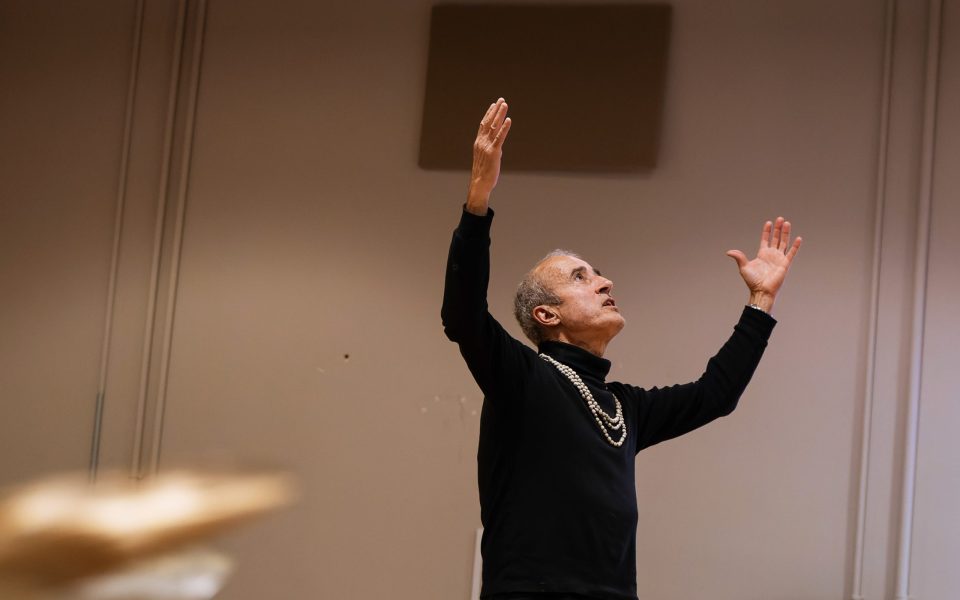All photos by Keira Lindgren
Bobby Previte’s Parlor Septet plays on Saturday night at the Flat Iron.
“Do not play a chord,” Bobby Previte says to Greensboro pianist Cyril Howard.
“Do not play a chord,” he repeats. “Don’t even think of it as a piano. You are now a drummer.”
Howard shrugs behind the keys and the group launches into a discordant improv perhaps 90 seconds in length; he adds choppy, sparse licks against erratic drumwork, keyboard runs from another piano, snippets form a soprano sax, a couple violins, electric and acoustic guitars, each going in their own direction but eventually coming together in something… interesting… complicated… definitely music. Towards the end, Howard inserts a tiny, two-note sparkle in a silent moment. Previte is pleased.
“You said more in those two notes than you could with all those chords,” he says.
A Bobby Previte improvisation masterclass is like this: He’s really pushing this small group of local musicians past their comfort zones, reaching inside them and pulling out something they might not have known they possessed.




The masterclass is part of his weeklong residency in Greensboro, kicking off with a show Saturday evening at the Crown featuring longtime collaborator and Gate City resident Charlie Hunter, and culminating on Saturday at the Flat Iron that will include locals Dave Fox, Brevan Hampden, Greg Hyslop, Michael Kammers, Butler Knowles and Reagan Mitchell.
But this week is devoted to his masterclass, running through Friday here at Revolution Mill, on folding chairs in a basement studio with raw-wood columns and brand-new sheetrock.
The night before he had them playing bad on purpose. Tonight he kicks off with a lecture in which he drops an impressive array of names — Thelonious Monk, Frank Zappa, Beethoven, Miles Davis, Coltrane, Jackson Pollock, Igor Stravinsky, Claude Debussey and former New York Yankee Paul O’Neill among them. And then there was a story about a reclusive Brazilian concert pianist who, when coerced to finally play again at a fancy New York party, set loose a chord that made Bobby Previtte cry.
“It’s not what you do,” the master says. “It’s how you do it.
“All B-flats are not created equal,” he continues. “Some are terrible — if they’re in the wrong place. Some B-flats are sublime.”






He’s teaching them today the beauty of simplicity in an improv setting, creative destruction, why they shouldn’t worry about whether something is bad or good and how to stray from their own tendencies.
“Be suspicious of your own defaults,” he tells them, “the places your hands always fall, the lines you play.”
He breaks the group into two combos — Howard and fellow pianist Lyn Koonce with electric guitarist Molly McGinn and drummer Tyler Monroe, against violinists Marta Richardson and Kate Musselwhite Tobey with acoustic guitarist Aaron Wiebe and Chloe White on a straight alto sax. He tasks the sides with creating 1-minute improv pieces, each musician coming up with just three lines of varying length, dropping them in when it feels right.
“If there is a place in the music no one is occupying,” he says, “occupy it.”
By the fourth turn they’ve produced something eminently listenable and entirely unique. That’s what he’s going for.
“When I don’t quite understand something,” he says, “that’s the best thing ever.”
Towards the end of the session, Previte sets the entire class loose on an improv, using the technique of “conduction” that has been a hallmark of his career as a bandleader.
He explains it thusly: “I’m gonna give hand signals, and then you follow my signals.”
“Go!” he says, then amid the ruckus gives specific hand instructions to Monroe, the drummer. He pairs Richardson and White on high-flying runs by raising his hands and wiggling his fingers. He teases an incongruent solo out of Tobey that flies amid the organized chaos and then simply ceases to be as the notes churn, then settle, then fade out.
It’s beautiful, the sort of piece that audiences in New York City would pay $150 a seat to witness.
And like all truly beautiful things — like Previte himself, who has just a week to leave his imprint on Greensboro — it exists only for that moment, never to be replicated again.
Join the First Amendment Society, a membership that goes directly to funding TCB‘s newsroom.
We believe that reporting can save the world.
The TCB First Amendment Society recognizes the vital role of a free, unfettered press with a bundling of local experiences designed to build community, and unique engagements with our newsroom that will help you understand, and shape, local journalism’s critical role in uplifting the people in our cities.
All revenue goes directly into the newsroom as reporters’ salaries and freelance commissions.


Leave a Reply